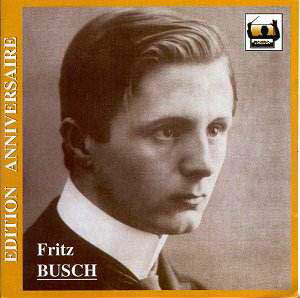As the War in Europe ended Fritz Busch was conducting
at the Metropolitan Opera with whom he was to tour for four years. He
also conducted in Chicago, later returning to a favoured haunt, Copenhagen,
where he always enjoyed great success. In 1950 he returned to Glyndebourne,
scene of some of his pre-War operatic triumphs. Meanwhile his gradual
return to Austro-Germanic music making came about after earlier implacable
refusals (personally declining Adenauer’s entreaty) – but he did consent
to appear at the Vienna Staatsoper and in 1951 he revisited West Germany,
conducting the orchestras in Cologne and Hamburg. These radio recordings
date from six months before Busch’s untimely death – he died in London
on 14th September 1951, shortly after having conducted Don
Giovanni in Edinburgh. Repertoire is well chosen to exploit Busch’s
enthusiasms – the Berlioz as an example of his operatic panache, the
Reger because of his association with the composer (violinist Adolf
Busch was equally adept at Reger and recorded him with remarkable results)
and the central Romantic German literature is represented by Schumann’s
Fourth Symphony.
He brings a jubilant energy to the opening of Benvenuto
Cellini, lines shaped with operatic finesse, though one not entirely
matched by the orchestra; trumpets are shrill and strident, balance
awry. In the first of Reger’s Variations he brings a romantic impulse
but one that is at all times freely moving graced with sensitively responsive
string playing and woodwind. There are some splendidly blistering trombones
in the Fourth Variation and a sense of real, unforced and organic rhythmic
momentum under Busch’s lead. He lavishes weight of string tone on the
central variations whilst vesting the Eleventh with a remarkable sense
of amplitude and depth. It has the span of an arc and the corresponding
significance of a tightly compressed tone poem, as it swells and coalesces,
shaped with superb rubato, string lines and woodwind aurally blended.
In Schumann’s self-called Symphonic Fantasy, the Fourth Symphony, Busch
expertly makes good use of, but never fusses over, the tightly argued
thematic material as it resurfaces at varying points in the first movement’s
development. There is a distinct sense of foreboding in Busch’s first
movement with dramatic motion and stygian trombones, the horns’ snapping
the thematic material onwards, all the while a sense of construction
and evolution being maintained through a sustained structural control.
The Romanze is fluent, mobile, avoiding of undue sentiment whilst the
Scherzo has a swaggering drive and sense of delicacy in close proximation.
The Finale is certainly vigorous but there is some superbly observed
detail – listen to the shapely rubato from 2’10 onwards, little agogic
displacements and dynamic variations and it’s in this sense that the
movement takes form and shape and cumulative structural meaning. Part
of Tahra’s recent series of single CD releases devoted to favoured conductors
to celebrate the company’s tenth anniversary there are bilingual notes.
An admirable release.
Jonathan Woolf


